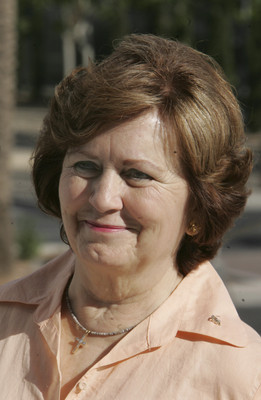Attorney points to witnesses
A defense attorney for Mary Kincaid-Chauncey argues that the former Clark County commissioner was deprived of a fair trial when a federal judge rejected proposed witnesses and gave the jury vague instructions on what constitutes a guilty verdict.
Federal Public Defender Franny Forsman told the 9th U.S. Circuit Court of Appeals on Wednesday that Kincaid-Chauncey was entitled to call witnesses who would testify that former strip club owner Michael Galardi lied when he testified he delivered them cash.
Forsman said testimony from the witnesses might have convinced jurors that Galardi lied when he took the stand and said he also delivered cash to Kincaid-Chauncey.
"The jury was entitled to know those things were false," Forsman said. "The jury only got to hear the allegations.
"I'm very curious why the government would put a perjurer on the stand," she later said of Galardi.
Kincaid-Chauncey was convicted in May 2006 of accepting cash bribes from Galardi in exchange for votes that favored his strip club empire. She has served one year of a 30-month sentence but appealed the conviction to clear her name.
Wednesday marked the first time the 9th Circuit has heard a full calendar in Nevada. The Thomas & Mack Moot Court on the University of Nevada, Las Vegas campus was packed with law professors and students to hear the Kincaid-Chauncey appeal and two unrelated appeals.
During the trial, Galardi told jurors that his bagman, former Clark County commissioner turned lobbyist Lance Malone, stuffed $20,000 in the purse of retiring Clark County Business Licensing Director Ardel Jorgenson.
"If she had been called (to the stand), she would have testified she didn't receive it," Forsman said.
Galardi also testified that former Commissioner Yvonne Atkinson Gates once tried to solicit $100,000 from him to make a controversial lap dance ordinance she had authored disappear.
"That county commissioner would have said that is not true," Forsman said.
The panel questioned why U.S. District Judge Larry Hicks would not allow the witnesses to testify but gave no indication of whether that was a strong enough argument to grant a retrial.
During the trial, defense attorneys argued that Malone might have pocketed the money instead of delivering it to the intended politicians.
"The defense elected to go with the Malone-is-a-thief theory," Assistant U.S. Attorney Daniel Schiess told the panel. He acknowledged that Galardi's testimony had inconsistencies and that his story to authorities changed over the years.
But his inconsistencies were irrelevant to Kincaid-Chauncey's case, he said.
Forsman also said that to secure a guilty verdict, the jury should have been instructed to identify a quid pro quo, meaning Kincaid-Chauncey accepted the money with an intent to work on behalf of Galardi.
"The instruction should have included receipt with intent to commit a particular act," Forsman said.
Kincaid-Chauncey acknowledged to FBI agents and again to the jury that she had accepted two contributions from Galardi, one to help with the cost to send her grandson to Olympic ski school and another for her son's Las Vegas City Council campaign.
Galardi testified that Malone delivered $5,000 cash to Kincaid-Chauncey on two other occasions. But Forsman said Kincaid-Chauncey denied receiving that money and did not consistently vote in Galardi's favor, so a quid pro quo could not be proven.
"The jury could have acquitted her if they just looked at the two incidents that she admitted to," Forsman said.
Schiess said that Kincaid-Chauncey generally would vote with co-conspirators Erin Kenny and Dario Herrera to push forward permits and licenses for Galardi's businesses.
Kenny pleaded guilty to taking bribes from Galardi, and Herrera was found guilty alongside Kincaid-Chauncey.
"If she took a contribution for ski school, there is nothing illegal about that," Schiess said. "If she took (money) with the intent to be improperly influenced ... she has then crossed the line into illegal conduct."
He said a quid pro quo does not have to be specifically defined for there to be illegal influence.
The jurists appeared to question whether Kincaid-Chauncey was improperly influenced.
Judge Marsha Berzon of San Francisco wondered aloud whether Kincaid-Chauncey "was listening to these people and wouldn't necessarily do what they asked her to do."
The appeals panel also consisted of Alex Kozinski of Pasadena, Calif., and Jay Bybee of Las Vegas. They considered two other cases after Kincaid-Chauncey's hearing.
The panel told attorneys for pilot John Borodkin and Omni Air to work out a settlement on Borodkin's defamation and wrongful discharge lawsuit against the airline. Borodkin said the FAA ordered a random alcohol test, which he failed, during his days off.
The FAA later expunged the test results from Borodkin's record, but Omni continued to report to prospective employers that the pilot was discharged for an alcohol-related offense.
Borodkin contended that Omni destroyed phone records that proved he was on his days off when he took the test.
"They destroyed the phone records," Kozinski said. "If that is not proof of malice, I don't know what is."
The third case involved Las Vegas businesswoman Diana Flaherty, who was convicted of fraud and money laundering. Flaherty falsely told investors that she had the technology to extract gold from volcanic cylinders.
The federal government alleged Flaherty bought a luxurious house and fancy cars but never produced the precious metals promised to investors.
Flaherty's attorney said that she is "borderline retarded" and did not fully understand the trial proceedings. He also said that she is from Taiwan and struggles to understand the English language.
Contact reporter Adrienne Packer at apacker@reviewjournal.com or (702) 384-8710.

















